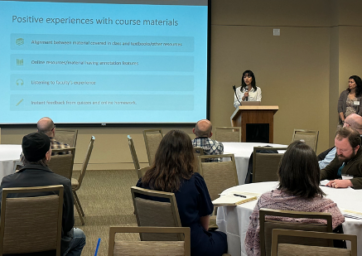Request Information
Ready to find out what MSU Denver can do for you? We’ve got you covered.
Open educational resources range from whole textbooks to smaller units of material like simulations and case studies. Check out a variety of places to find OER below.
OpenStax out of Rice University
The Open Education Network’s Open Textbook Library
BC Campus OER by Discipline Directory
Rather than using traditional copyright (all rights reserved) for your work, you can choose a Creative Commons license (some rights reserved). But which license do you want to choose?
Learn more about the four license elements, attribution (BY), non-commercial (NC), share alike (SA), and no derivatives (ND):
We need our materials to be accessible to all of our students!
At MSU Denver we have accessibility training opportunities through the Center for Teaching, Learning and Design, including guides on:
Check out the Open Washington Module 9 for accessibility considerations for OER. Note that we use YuJa for our videos, check out the Multimedia Accessibility guide for more information!
Jeff Gallant and Tiffani Reardon, both of Affordable Learning Georgia, made a very well-received presentation on OER accessibility at the November 2020: https://www.youtube.com/watch?v=0Px8m67sPAM
Disabled and Here (CC BY license requires attribution) https://affecttheverb.com/collection/
Nappy.co (CC0 public domain license; no attribution required) https://nappy.co/
NatureStock (CC0 public domain license; no attribution required) https://freenaturestock.com/
Pexels (license allows free use; attribution appreciated) https://www.pexels.com/
Picnoi (attribution required) https://picnoi.com/
Pixabay (license allows free use; attribution appreciated) https://pixabay.com/
StockSnap (CC0 public domain license; no attribution required) https://stocksnap.io/
The Gender Spectrum (CC BY-NC-ND means no derivatives allowed, must give attribution, but may use for free) https://genderspectrum.vice.com/
Unsplash (license allows free use; attribution appreciated) https://unsplash.com/
WOC in Tech (license CC BY requires attribution) https://www.flickr.com/photos/wocintechchat/
There was also a 2020 BC Campus blog post with many open sources for diverse images:
Stock photos focused around diversity, equity, and inclusion

Valeria Castaneda presenting at the State OER Conference in May 2023.
MSU Denver senior Valeria Castaneda and Dr. Emily Ragan interviewed 12 MSU Denver student about their positive and negative experiences with course materials in Spring 2023. Students want faculty to be strategic about which resources they select and to use them robustly! Learn more about their findings here: Student Interviews on Course Materials
Perhaps the easiest first step toward using OER is adding an OER textbook as a supplemental resource on your syllabus.
Adopting OER can mean just switching to an existing OER textbook, or it can be a thoughtful course redesign of your entire course to integrate a variety of resource and learning experiences throughout your course. Some resources that will help you think about how to effectively design your course are available below.
Visit https://www.msudenver.edu/teaching-learning-design/instructional-design/oer/
The instructional design team in the CTLD also developed a guide to using a social annotation tool, hypothesis, in Canvas: https://ready.msudenver.edu/canvas-spotlight/use-hypothesis-for-collaborative-annotations-on-documents-in-canvas/
Visit the OER Implementation Collection provided by experts from NC State University, East Carolina University, UNC Greensboro, UNC Charlotte, North Carolina A&T, University of North Carolina School of the Arts, and UNC Chapel Hill.
Learning objectives describe what a learner should be able to do after a certain point (assignment, activity, course, etc.)
Effective learning objectives are specific and measurable, which facilitates assessment.
A common stem is “students will be able to…” followed by an action verb and additional description. See the handout below for example words grouped by Bloom’s taxonomy
Another strategy is to write learning objectives as questions that students can ask themselves
Note that some verbs are tempting but too vague to be measurable. Avoid using the following in your learning objectives:
You may be able to find existing content to use in your Canvas courses. Learn more about the Canvas Commons.
Faculty efforts around OER adoption, adaption and creation can relate to the tenure process in multiple ways. Some departments are adjusting their guidelines so that faculty OER creation projects count under scholarship. Extensive course redesign, which includes integrating OER, is work related to teaching.
A helpful framework for thinking about OER work in the context of tenure and promotion is available from an organization of systems in higher education, DOERS3.
MSU Denver faculty have a wealth of experience implementing OER across a wide variety of courses.
Reach out to OER coordinator Emily Ragan to get connected to faculty who have done work in a similar field or with similar types of resources.
